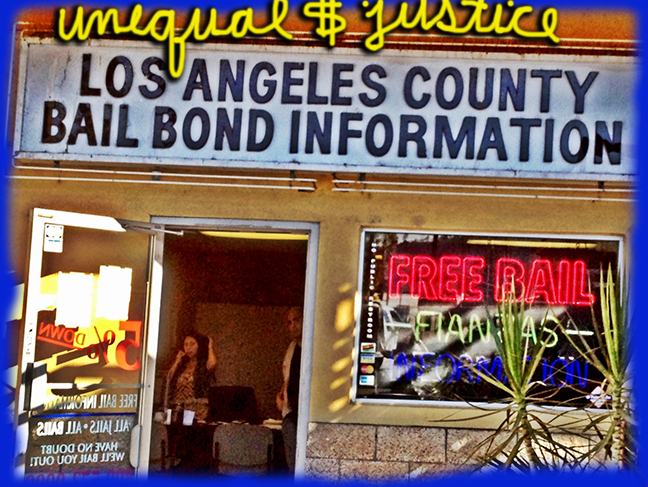In the past year, Equal Justice Under Law, a Washington DC based civil rights group, has filed nine class action challenges in seven states hoping against cities’ money bail systems that, in the simplest terms, allow the affluent to go free when charged with the same crimes that keep poor defendants in jail when awaiting trial.
With their filings, the group has, thus far, gotten cities in Alabama, Missouri, Mississippi, and Louisiana to reform their practices of using of secured money bail for new arrestees.
The organization’s most recent battle site is in San Francisco, CA, where, on Tuesday, the class action lawsuit hit an unexpected snag in the courtroom of U.S. District Judge Yvonne Gonzalez Rogers of Oakland, who denied the lawsuit class action status and gave the plaintiffs and their lawyers 30 days to “think of a legal avenue” to continue their efforts to force reform of the SF bail system.
The plaintiffs filed the suit with the help of San Francisco’s refreshingly reform-minded public defender, Jeff Adachi, who also filed a court declaration in support of the suit, writing, “A fair system of pretrial justice would not rely on monetary conditions, as such conditions penalize arrestees solely based on their wealth status.”
Bail reform supporters call the judge’s ruling “discouraging,” since the class action lawsuit has produced tangible results, with no such judicial roadblocks in at least four other states.
Meanwhile, Zachary Norris, executive director of the Ella Baker Center in Oakland and Mary Lou Fulton, a senior program manager at the California Endowment, have written an excellent Op-Ed for the LA Times detailing exactly why this lawsuit is so important.
Here’s a clip:
On any given day, two-thirds of the people sitting in California jails haven’t been convicted of anything. These 42,000 people are simply awaiting their day in court, many of them incarcerated for no reason other than being too poor to post bail.
That fundamental unfairness is at the center of a federal case getting underway Tuesday in San Francisco. The class action suit asserts that California’s bail system allows rich people to buy their freedom while awaiting trial, but assumes poor people endanger community safety and can’t be trusted to show up on their court date.
The Washington D.C. group was helped with its local filing by the SF Public Defender’s Office and public defender Jeff Adachi who, in the declaration he filed in support of the class action suit wrote, “A fair system of pretrial justice would not rely on monetary conditions, as such conditions penalize arrestees solely based on their wealth status.”
One of the lead plaintiffs is Riana Buffin, who was arrested in San Francisco on suspicion of theft and conspiracy, and jailed when she couldn’t produce $30,000 in bail money. The 19-year-old Oakland resident was given no opportunity to tell a court officer that she had a job, lived with her mom and three younger brothers, and posed no flight risk or danger to the community. A few days later, the charges against her were dropped. But because Buffin missed work while being jailed for a crime she didn’t commit, she lost her job as an airport baggage handler.
In California, the bail process varies depending on where you’re arrested. In some counties, judges can quickly release people to await their court date at home. But in others, like San Francisco County where Buffin was arrested, those without bail money are stuck.
Bail isn’t pocket change either. The median amount in California is $50,000 — five times higher than the national median. Most people don’t have anything close to that kind of cash available; a survey last year found 37% of Americans couldn’t cover even a $500 car repair bill. Many wind up turning to a bond company to get released. But bail bondsmen charge about 10% of the bail amount, money people don’t get back if charges are dropped. Still, people agree to that debt because a short stay in jail can cause major struggles, such as losing a job or custody of children.
Bail compounds the already substantial race and class discrimination problems rampant in the justice system. People of color experience higher arrest rates to begin with. Then they are charged with crimes that carry heavier sentences and in turn face higher bail amounts. Finally, those who can’t afford bail are more likely to give in to pressure to plead guilty. Research shows that those jailed while awaiting trial end up receiving longer sentences than people facing similar charges who are able to wait for their court dates at home.
Norris and Fulton point out that the County of Napa has already instituted a well-thought-out system of bail reform and amazingly the sky hasn’t fallen. “In Napa County,” they write, “more than 90% of those released pending trial show up for court and stay out of trouble in the meantime.”


How else are you going to get them back in court. If people were not in trouble then they wouldn’t have to get bailed out. Most people that haven’t been in trouble are allowed an OR and Prop. 47 has totally changed the amount of people entering into the jail system. People are committing the same theft offense up to 8 times and not one day of jail. Well that worked didn’t it?